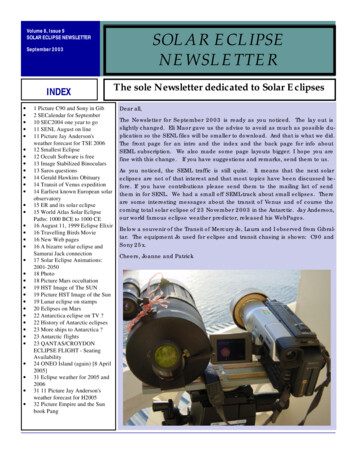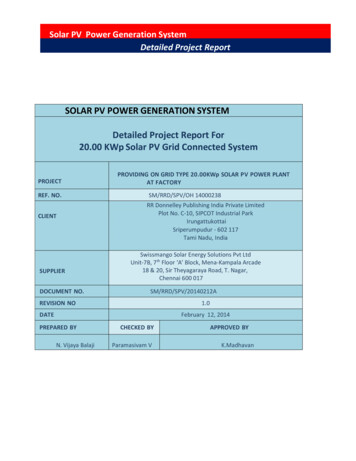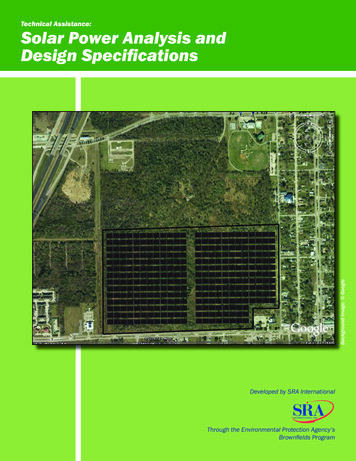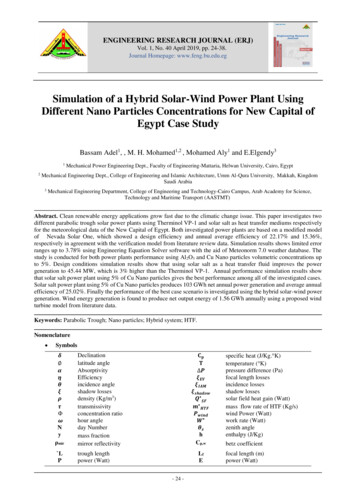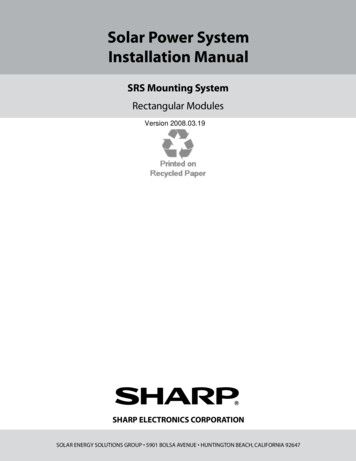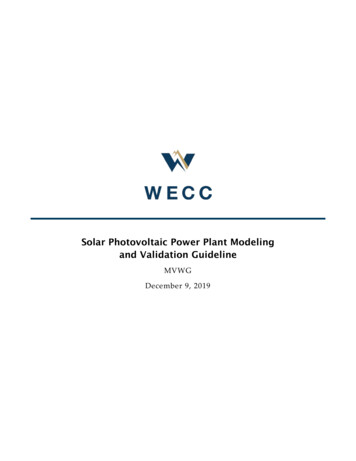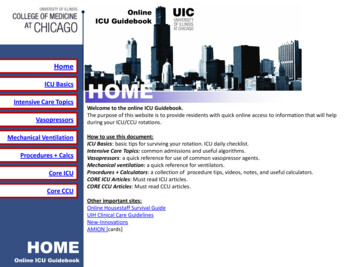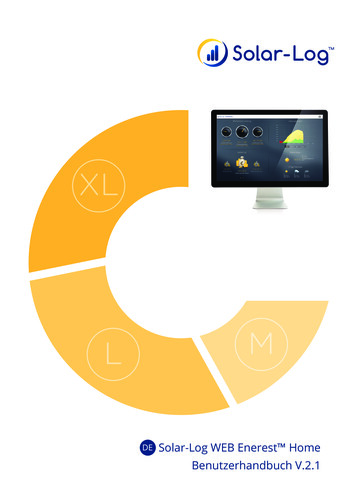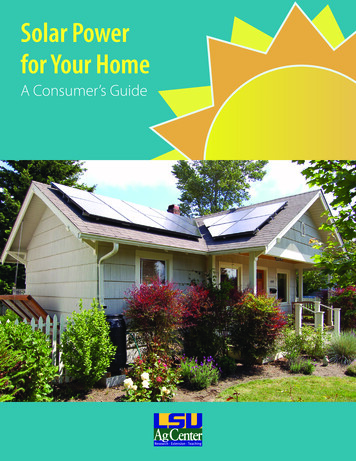
Transcription
Solar Powerfor Your HomeA Consumer’s GuideLSU AgCenter Pub. 3363 Solar Power For Your Home: A Consumer’s Guide1
AcknowledgmentsAuthorClaudette Hanks Reichel, Ed.D.Professor and Extension Housing SpecialistDirector, LaHouse Resource CenterLSU AgCenter – Louisiana Cooperative Extension ServiceThis guide was enhanced by the contributions and reviews of the following expertswhose input is greatly appreciated:Content Contributors:Sheri Givens, Givens Consulting LLC (Texas)Shandy Heil, Extension Associate, LSU AgCenterReviewers:Bart Bales, P.E., M.S.M.E., Bales Energy Associates (Massachusetts)Ed Comer, Vice President / General Counsel, Edison Electric InstituteDanielle Daniel, Technical Editor, Florida Solar Energy Center, University of Central FloridaSteve Easley, Steve Easley & Associates Inc. Construction Consultants (California)Elizabeth Gall, Extension Youth Energy and Environment Specialist, Tennessee State UniversityMichael Goldschmidt, L.E.E.D., A.P., E.D.T.C., Extension Housing and Environmental Design Specialist,University of Missouri ExtensionRebecca Harsh, Director, Retail and Consumer Policy, Edison Electric InstituteLon Huber, Energy Policy Specialist, Arizona Residential Utility Consumer OfficeSarah Kirby, Associate Professor and Extension Housing Specialist, North Carolina State UniversityHal Knowles, Program for Resource Efficient Communities, University of FloridaPaul LaGrange, Extension Building Science Educator, LSU AgCenter and LaGrange Consulting (Louisiana)Brian McCormack, Vice President, Political and External Affairs, Edison Electric InstituteJanet McIlvaine, Senior Research Analyst, Florida Solar Energy Center, University of Central FloridaMike Murphy, Design Engineer, Solar Alternatives (Louisiana)Jeffrey Ono, Consumer Advocate, State of HawaiiUtility and home energy experts with:The American Public Power Association and The National Rural Electric Cooperative AssociationProduced by: LSU AgCenter CommunicationsPhotographs:Image gallery ofU.S. Department of Energy’s National Renewable Energy LaboratorySpecial thanks for facilitating this project:Karen Soniat, Director of Communications and External Relations, LSU Law SchoolCopyright 2015 by LSU AgCenterThis publication was partially funded by a grant from the Edison Electric Institute.2LSU AgCenter Pub. 3363 Solar Power For Your Home: A Consumer’s Guide
Why Go Solar?Table of Contents7 Basic Steps To Going Solar.2When Should I Add a Solar Power System to My Home?Before You Go Solar.3Analyze Return on Investment (Savings and Payback).3Find Incentives.4Examples From DSIREUSA.org.4What Is In a Home Solar Photovoltaic (PV) System?Solar PV Basics.4Types of Home Solar Power Systems.5Net Metering.6Community Solar or Renewable Power Programs.6Types of Solar Photovoltaic Technologies.7Crystalline Solar Cells.7Thin Film Solar Cells.7Future Technologies.7Where Will My Home Solar System Work Best?Placement of Your Solar System.7Orientation.7Tilt.8Tracking Arrays.8Shade.8Your Geographic Solar Resource.8How Do I Size, Install and Maintain My Solar System?Sizing Your Solar Power System.8PV Power Rating.9Available Solar Resources.9PV Electricity Generation.9The NREL PVWatts Calculator.9Installation Considerations and Tips.9Operation and Maintenance. 10Who Should I Hire To Install My Home Solar System?Get a Strong Contract. 11Examine Warranties. 11Which Is Better for Me – Buying or Leasing?Leasing a Home Solar Power System. 12Be Cautious About Predicted Savings. 12Additional Solar Lease Contract Provisions. 13Purchasing a Home Solar Power System. 13Sample Scenarios. 14Comparing Buying Versus Leasing. 15ResourcesFor More Information. 16Bibliography. 17AppendicesSolar Leasing Versus Ownership Calculators. 18Questions To Ask When Considering a Solar Power System for Your Home. 19Additional Questions to Ask When Considering a Solar Lease. 20LSU AgCenter Pub. 3363 Solar Power For Your Home: A Consumer’s Guide1
Are you thinking about adding a solar energy systemto your home to generate electricity? If so, thisconsumer guide will help you explore various options,ask important questions and make a well-informeddecision.Photovoltaic or PV, systems convert lightenergy to electricity. Other solar energy technologies,such as solar water heating systems, work by capturingand redirecting heat from the sun, but this guide isfocused on systems to generate electricity for yourhome.Although photovoltaic technology has existed fordecades, its use in both rooftop solar and communitysize solar systems has been rising nationwide. Solarpower offers valuable benefits, but there also aremany things to consider when thinking about a solarphotovoltaic system.Why Go Solar?The sun is a renewable source of clean energy and that’san increasingly valued benefit. Solar photovoltaic (PV)systems produce electricity without emissions of airpolluting gases, greenhouse gases and particles that arebyproducts of combustion or burning fuels. The supply of“fuel” for solar PV systems – sunlight and solar heat – isendless and free. That doesn’t mean the electricity is free,but you may be able to save money.With the ongoing advancements in solar PV technology,the cost of solar power continues to drop and its use ison the rise. Since solar PV systems are long-lasting andrequire little maintenance, the cost of producing electricityremains relatively stable and predictable over a long time.Owning a home solar power system can be insuranceagainst energy cost increases that affect other powersources. In addition, studies in various locations found thathomes with PV systems sold for several thousand dollarsmore than comparable nonsolar homes.Rooftop solar power creates a system of distributedgeneration (many small-scale power plants) that helpsmeet area power needs. Solar power that is produced attimes of high electricity demand (typically late afternoon)is high-value electricity since it offsets energy purchase orgeneration when the cost is higher.You may have personal motives to go solar. You may wantto reduce your energy bills and/or increase your propertyvalue. You may like the idea of producing some of yourown power at home. You may value the opportunity to doyour part to conserve energy and promote environmentalquality by using an eco-friendly renewable energyresource.2LSU AgCenter Pub. 3363 Solar Power For Your Home: A Consumer’s GuideBecause of these benefits and to promote energy resourcediversity and green economic development, solar energyuse is encouraged by public policy. There are manyfinancial incentive programs to spur development ofrenewable energy, grow green jobs and make it moreaffordable for you to go solar.Despite the benefits, there are several factors that can limithome solar power: Cost is the primary hurdle for solar power systems atevery home. A solar system that can power a home isexpensive. Financing may not be available or affordableor the homeowner may not qualify. Finding andevaluating financing options can be an intimidating andconfusing process. Solar energy isn’t continuous, since it’s not availableat night and is reduced greatly when it’s cloudy orthe panels are snow covered, shaded or dirty. As aresult, another source of electricity must be ready toprovide power whenever it’s needed (such as an electricutility company, whole house generator or a large andexpensive battery storage system). Also, rooftop solar isnot equally effective in all areas and climates. Rooftop solar isn’t feasible when neighboring structuresor landscaping block access to sufficient sunlightexposure. Some roofing ty
of the solar system needed to supply your power needs. An exception to this general rule would be when major solar incentives are available but will soon expire or may be reduced. In such a case, it may be reasonable to first install a solar energy system that can supply up to half of your annual power need so you can take advantage of the
